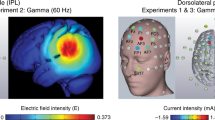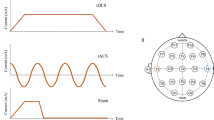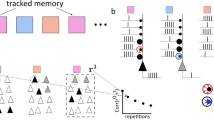Abstract
THE responses made by young normal adults to various methods of dichotic stimulation have been extensively investigated and reported upon by Broadbent1. His observations have led him to postulate that both perceptual (‘p-system’) and storage (‘s-system’) mechanisms are necessary for the production of correct responses to such stimulation. If this were the case, then the transmission of such material should be disrupted by any disturbance of the storage system. I have suggested2 that a gross form of such disturbance is to be found in elderly persons suffering from memory disorder.
This is a preview of subscription content, access via your institution
Access options
Subscribe to this journal
Receive 51 print issues and online access
$199.00 per year
only $3.90 per issue
Buy this article
- Purchase on SpringerLink
- Instant access to the full article PDF.
USD 39.95
Prices may be subject to local taxes which are calculated during checkout
Similar content being viewed by others
References
Broadbent, D. E., “Perception and Communication” (Pergamon Press, 1958).
Inglis, J., J. Abnorm. Soc. Psychol., 59, 210 (1959).
Author information
Authors and Affiliations
Rights and permissions
About this article
Cite this article
INGLIS, J. Dichotic Stimulation and Memory Disorder. Nature 186, 181–182 (1960). https://doi.org/10.1038/186181b0
Issue date:
DOI: https://doi.org/10.1038/186181b0
This article is cited by
-
Gen�gt der Begriff ?Aufmerksamkeit? zur Erkl�rung des sogenannten Lateralit�tseffekts ?
Psychologische Forschung (1971)



